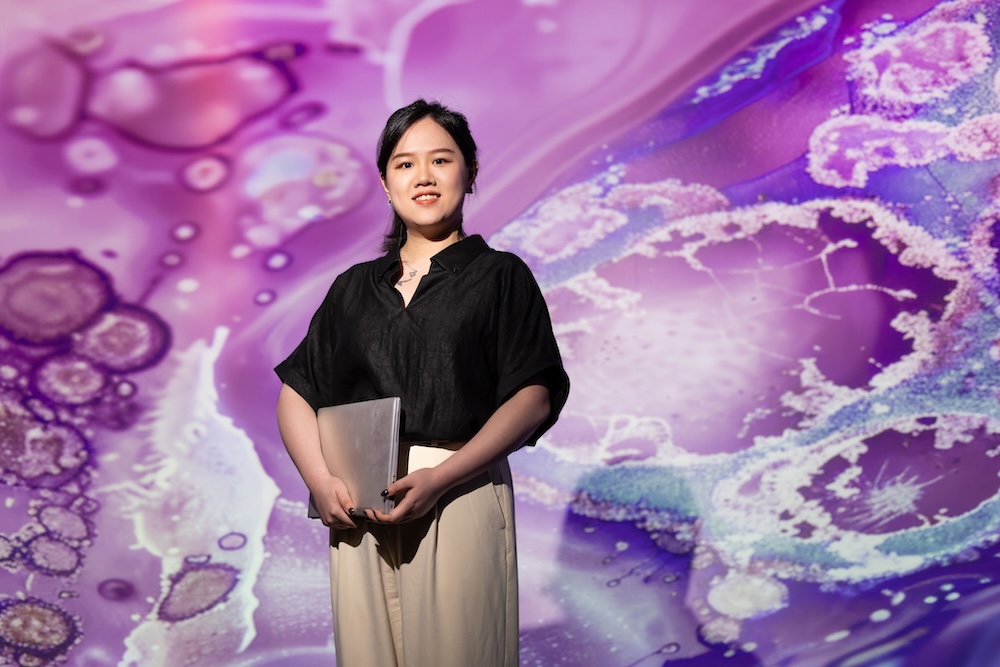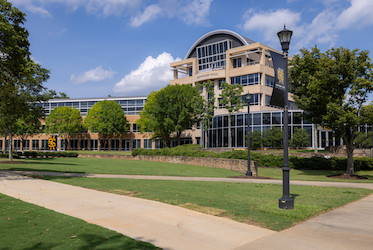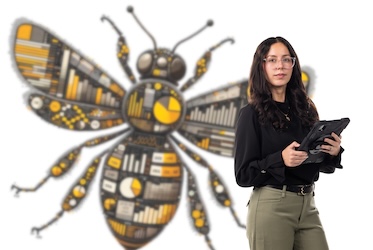
Kennesaw State doctoral graduate advances breast cancer research
KENNESAW, Ga. | Sep 10, 2024

Zhang, who recently defended her dissertation to earn a Ph.D. in Data Science and Analytics from Kennesaw State University, delves into the detection of abnormalities in screening mammography, which can help find breast cancer early.
“Imagine your body is a big city, and the cells are the people living in it,” Zhang said. “Sometimes, some people (cells) start acting strange and causing trouble, just like bad guys in the city. My job is to find out from the ‘forensic photography’ of where these bad guys are starting to cause trouble and figure out ways to prevent them so everyone can be happy and healthy again.”
Her research, guided by KSU and Emory faculties, involves using AI to classify images of breast cancer. Zhang has utilized a decade's worth of material from Emory University to enhance her research, providing a comprehensive dataset for analyzing mammogram images.
“Artificial intelligence is like having a super-smart assistant who can help the radiologists to analyze a vast amount of data much faster and more accurately,” she said.
AI helps to detect patterns and abnormalities in screening mammograms, enabling earlier detection and more personalized treatments. This innovative approach could elevate breast cancer research by advancing treatment development and improving patient outcomes.
Zhang’s recent findings have been featured at the Society for Imaging Informatics in Medicine annual meeting. Her research found that the AI model isn’t equally accurate for all groups of people. The model's predictions vary depending on the patient's background, health conditions, and the details in the images.
Breast cancer is the most common cancer among women and causes about 42,000 deaths annually in the U.S. Getting regular mammograms can lower the risk of dying from breast cancer by up to 48 percent because they help spot problems like lumps or unusual changes early on.
A recent study by Zhang found that when mammograms show certain types of changes, like architectural distortion in the breast tissue, the risk of missing a cancer diagnosis is increased. This means the screening might overlook cancer cases when these changes are present, which could delay early detection and treatment. Zhang's research leverages ten years of data from Emory University, enhancing the accuracy and depth of her analysis.
“Science is a journey of discovery,” she said. “Each step we take brings us closer to understanding this complex disease and finding new ways to combat it.”
Zhang’s academic journey began in China where she earned a bachelor’s degree in biological sciences from Hubei University. Zhang then earned two master’s degrees in chemical biology and bioinformatics at the University of Michigan and the Georgia Institute of Technology. Her educational foundation prepared her for advanced research at KSU, where she discovered her passion in data science.
“I decided to switch to data science because I wanted to use the most efficient tools to do research in healthcare,” Zhang said. “I’m really interested in using data science and machine learning to build better tools that could improve people’s lives.”
In addition to her research, Zhang mentors undergraduate students and participates in outreach programs, emphasizing the importance of diversity in science.
“I’m a researcher, but more to that I’m a people person; I cherish people and appreciate their support. It’s the strong motivation of improving people’s living that drove my passion for research, and all the support I got from people at KSU continuously fuels that enthusiasm,” she said.
Zhang’s commitment also extends to ensuring fairness and accuracy in AI models used in her research.
“We’re training the computer to be intelligent and accurate enough to help detect abnormalities in mammograms and assess the risk of breast cancer through them,” she said. “AI can be a strong helper to the medical professionals if being used appropriately, and to ensure the ethics of AI tools in completing the tasks, our goal is to ensure the model is fair and unbiased across all demographic groups.”
Zhang identified biases in her AI model by analyzing where it failed. She found the model was less accurate with dense tissue and images with structural changes. Using these insights, she is now developing a model that performs equally accurately in all patient subgroups for breast cancer detection and hopes her work will aid other researchers.
Her experience at KSU has been overwhelmingly positive.
“Everyone here is so friendly and supportive,” Zhang said. “From the PhD program department to the School of Data Science and Analytics, the College of Computing and Software Engineering, and the Graduate College, everyone has been incredibly helpful.”
She also values her collaboration with industry partners like Equifax, which has allowed her to apply her academic knowledge in real-world settings.
MinJae Woo, Zhang’s former advisor at KSU, highlighted the rigorous demands of medical research and praised Zhang's perseverance.
“Working on medical research is often more challenging than it seems. We frequently ditch projects after putting in months of effort if they end up showing no potential benefit for patients. Dr. Zhang did not give up despite these challenges and discouragement. Her perseverance was undoubtedly the key to her success as a researcher.”
Looking ahead, Zhang plans to continue her research and apply innovative ideas to healthcare and beyond. Her work aims to advance the understanding of breast cancer and improve patient care and outcomes, demonstrating her dedication to making a significant impact in the fight against the disease.
– Story by Raynard Churchwell
Photos by Matt Yung
Related Stories

Kennesaw State student leverages Double Owl Pathways program to accelerate career path

Kennesaw State graduate program shines at national orthotics and prosthetics conference

Kennesaw State's online degree programs nationally ranked by U.S. News

Kennesaw State student uncovers hidden stressors threatening honeybee colonies nationwide
A leader in innovative teaching and learning, Kennesaw State University offers undergraduate, graduate, and doctoral degrees to its more than 47,000 students. Kennesaw State is a member of the University System of Georgia with 11 academic colleges. The university’s vibrant campus culture, diverse population, strong global ties, and entrepreneurial spirit draw students from throughout the country and the world. Kennesaw State is a Carnegie-designated doctoral research institution (R2), placing it among an elite group of only 8 percent of U.S. colleges and universities with an R1 or R2 status. For more information, visit kennesaw.edu.














